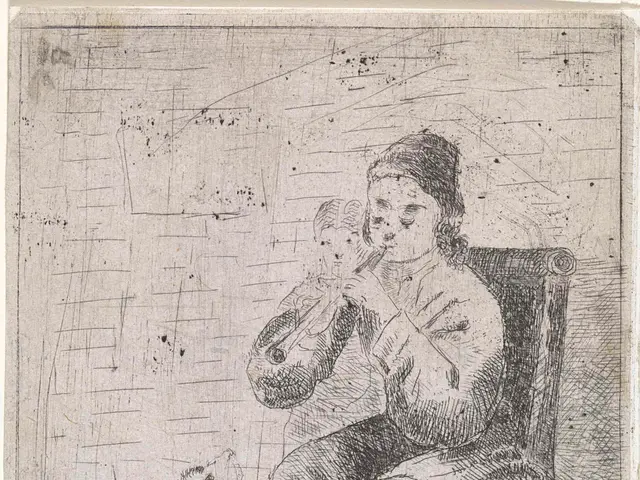The reason behind labeling the initial installment of a series as a "pilot" episode.
Firing Up the Small Screen: What Makes a Killer TV Pilot
Let's dive into the world of television production and uncover the secrets of a knockout pilot episode. You know, the one that convinces the bigwigs to greenlight the entire series. So, why do they call the first episode of a show a pilot?
A TV pilot is a standalone episode that serves as a test run. It demonstrates the show's tone, characters, and narrative structure to the executives sitting pretty in their leather chairs, making decisions on what deserves the big bucks.
You might have told your grandma that you "shot a pilot" after your summer break, leading her to worry about you and aviation. Rest assured, no planes were harmed during the making of that episode!
The entertainment industry likes to borrow terms from other industries, and the "pilot" is no exception. In the scientific and research communities, a "pilot study", "pilot project", or "pilot experiment" typically refers to small scale investigations geared towards determining the feasibility of a larger undertaking.
Writing your first pilot script? Fancy giving it a go? We've got you covered with our free resources.
Pilots play a critical role in the TV industry, serving as a bridge between raw ideas and series orders. They're essentially a low-investment leap of faith for executives, inviting creatives to prove their concepts are worth the screen time.
Wondering if a pilot is the right path for your TV dreams? Follow along to find out what it takes to create a successful pilot and make your mark in the world of glitz and glamor.
What's the Real Purpose of a Pilot?
The world of entertainment can be as captivating as it is cutthroat. At its heart, it's a business, and one that often deals in serious coin. When money is flowing like a river, those making the financial calls want to minimize risk as much as possible.
The production of a pilot marks an early stage in the development process and acts as a way for the network executives to challenge creators to prove their visions can translate to the small screen.
Take the groundbreaking series Game of Thrones, for example. At its launch, the show was the most expensive ever made, with each episode costing around $10 million. Before parting with a whopping $100 million for a 10-episode series, HBO first wanted to see a pilot to confirm that the creators' vision would come to life as intended. After witnessing the magic, HBO gave a green light to the full series, and the rest, as they say, is history.
So, what did the Game of Thrones pilot do so right that made it such an obvious candidate for a series pickup? Let's delve into the components that define a successful pilot.
The Ingredients of a Hit TV Pilot
Pilots have a tough job on their hands: they need to encapsulate your entire TV concept in just one episode, giving viewers a taste of essential elements like setting, characters, and themes, but also structure and pace.
Just picture the first episode of Game of Thrones: within those 50 minutes, you're introduced to major protagonists, antagonists, themes of honor and ambition, the expansive scope of the show, its visual style, its fast-paced narrative, and more.
By showcasing every element of your show in action, you can give executives the confidence they need to commit to a full series order. Let's examine the pillars that make up the most successful television pilots:
1. World-Building
Your pilot needs to establish the genre, premise, and tone of your show. Is it a comedy, drama, or anthology? What message or theme will it explore? What's the world your story inhabits, and how will that shape the tone of the show?
2. Characters
If the characters in your pilot aren't believable or well-developed, it doesn't matter what else is going on! A pilot's primary mission is to thinkfully introduce viewers to the show's characters and set the stage for viewers to enmesh in the show for years to come.
3. Themes
A pilot should not only introduce characters but also touch on the show's central themes and overall intent. This might evolve over the series, but viewers should be able to understand its core message from the outset.
4. Promise
Finally, you need to hook the network executives just like you'd hook your audience! Paint a vivid picture of the broader potential of your show and create a cliffhanger that leaves them eager to see more.
Time to Soar
Modern streaming platforms and an unprecedented demand for video content have led some studios and networks to order full series directly, skipping the pilot phase altogether. Despite this, the traditional pilot system continues to serve as an essential hurdle for promising shows to secure funding, particularly within traditional network television.
In a world overwhelmed by content, a well-crafted pilot is the key to separating the television powerhouses from the also-rans. Sure, you could create something that fades into oblivion, or you could unleash a show worthy of your wildest dreams. The choice is yours—grab your quill and ready yourself to make television history!
Author
- Andrew Stamm Andrew Stamm, based in London with his wife and dog, spends his days as Partner and Creative Director at Estes Media, a burgeoning digital marketing agency. In his free time, he enjoys baking, hiking, and consuming as many obscure films as possible.
A well-written pilot script can serve as a stepping stone for TV creatives, showcasing their concepts' potential to network executives and securing funding for the full series. Drawing from the example of Game of Thrones, which went through a pilot phase before receiving a series order from HBO, a successful pilot episode must encapsulate the show's genre, tone, characters, themes, and overall promise. By following the pillars outlined above, such as world-building, character development, theme exploration, and leaving a cliffhanger, screenwriters can ace the screenwriting industry's trial by fire and pave their path to producing an unforgettable television series.








